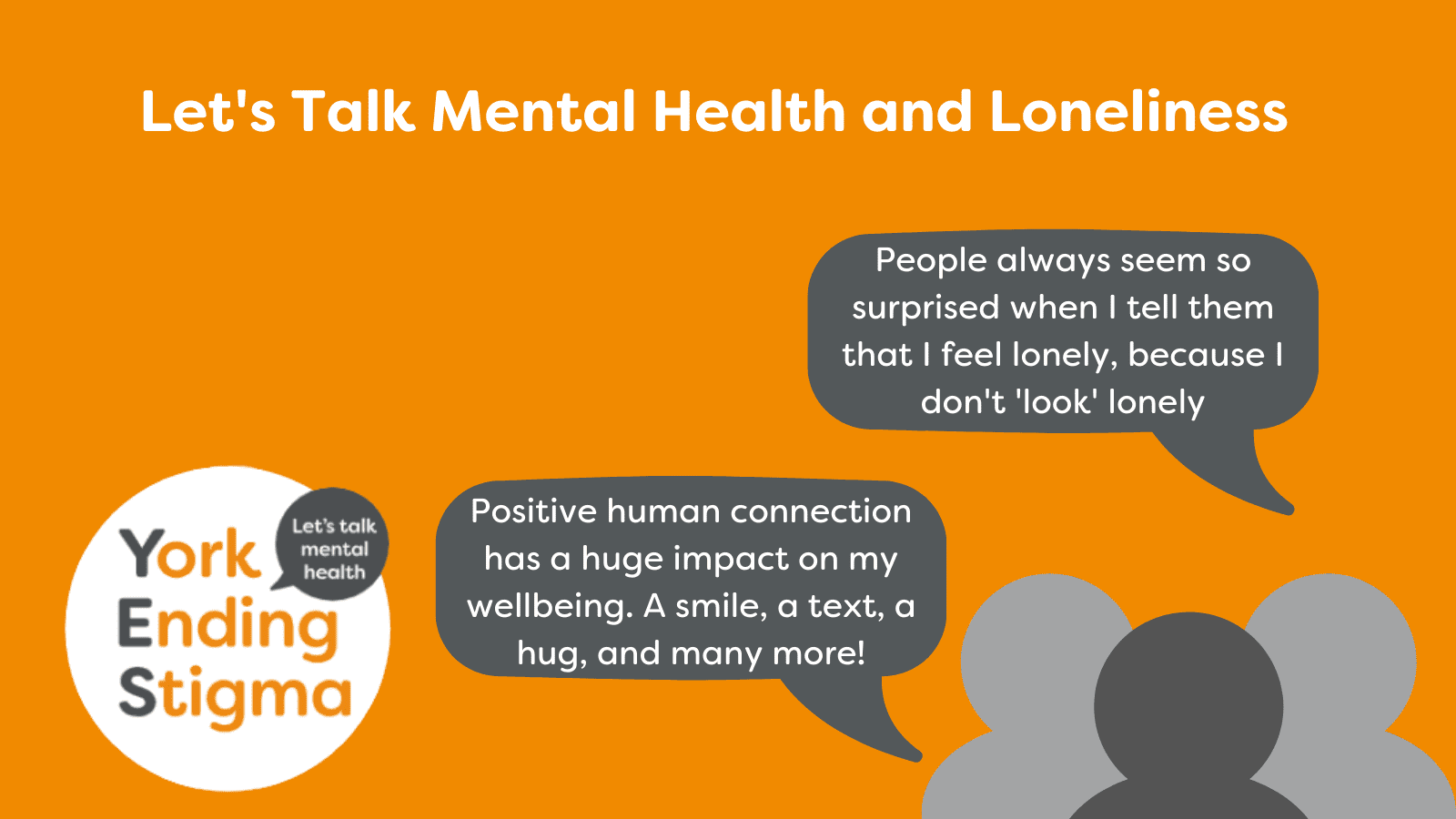
To coincide with Mental Health Awareness Week 2022, we (York Ending Stigma) hosted an online “Let’s Talk Mental health and Loneliness” event. York Ending Stigma (YES) Champions Emma, Maddy, Miles, and Sarah formed the panel of people sharing their experiences of loneliness, the impact on their mental health, and some of the things they have done to improve their connections. They were supported by Champion Lauren, who acted as chat moderator and qualified Mental Health First Aider.
Loneliness
Loneliness was the national theme for Mental Health Awareness Week 2022, and the event began with Emma asking the audience to type into chat the first thing they thought of when hearing that word. There were a wide range of answers, with the most common being:
• Isolation
• Sadness
• Alone
• Unhappy
It is clear when we think of loneliness that the same sort of feelings emerge, but what causes these, and how can we effectively include those who are feeling this way? Emma introduced the biggest UK survey on loneliness conducted in association with Wellcome Collection and the BBC which surveyed 55,000 people in 2018 (we note that this was before the covid-19 pandemic). The study defined loneliness as the following 5 things:
- Having nobody to talk to
- Feeling disconnected from the world
- Feeling left out
- Sadness
- Not feeling understood
It was then time for our panel members to explain their personal experiences:
Maddy first felt lonely after the death of a parent, and secondly when she went abroad to work and knew nobody in her new home, and wasn’t fluent in the local language. Miles found himself struggling with addiction, alienating both family and friends before he was able to admit his issues and seek long term help and support. Sarah had known that their neurodivergence made them feel isolated and different from everyone around her for decades, and knew they would need to find real life solutions. Emma has lived with mental illness since childhood and believes this has caused a lot of her experiences of loneliness. Emma shared that she still experiences loneliness at times.
“I just want to say thank you to the panel for sharing, it’s been really valuable and interesting” Event attendee
Connection
After the honesty from our Champions about their experiences of loneliness, we then asked our audience to tell us what things they do when feeling lonely to maintain their connections and feel happier, which provided a helpful range of interesting and enlightening results including:
• Play video games
• Exercise
• Hobbies
• Find like-minded friends online
• Community projects
• Pets
• Work
We then went back to the BBC Survey which suggests nine ways to feel less lonely:
1. Find distracting activities or dedicate time to work, study or hobbies.
2. Join a social club or take up new social activities and pastimes.
3. Change your thinking to make it more positive.
4. Start a conversation with anyone.
5. Talk to friends or family about your feelings.
6. Look for the good in every person you meet.
7. Take time to think why you feel lonely.
8. Carry on and wait for the feeling to pass.
9. Invite people to do things without fearing rejection.
Going back to the panel, our Champions shared their own connection experiences. Maddy worked with older people after bereavement, and used video calling to keep herself in touch with family and friends, and to strengthen her existing connections. Miles became part of an online peer group mutually supporting people in recovery, and has made deep and lasting friendships with likeminded people.
Sarah started an exercise journey which has given them the confidence to become a full-time writer and poet, and although Emma stated that she is a work in progress, and that being open and honest about her mental illness has helped her to gain more meaningful connections, alongside participating in work and hobbies with other people.
People in the chat also shared their own experiences of loneliness, which for many were exacerbated by the effects of being in lockdown. It was then asked if York has a specific strategy to ease loneliness, which is not the case at present, but it was thought that tackling loneliness was woven into other government funded work in the city designed to improve people’s lives, e.g. the Mental Health Transformation Fund.
Our event was rounded off by a discussion with the panel and the audience which covered loneliness caused by isolation due to long term illnesses such as ME and fibromyalgia, and a question as to whether the Red Cross provide loneliness support, which they do. A member of the audience mentioned social prescribing as a means by which loneliness can also be supported.
“Such an interesting, valuable, informative and honest session – thank you!” Event attendee
Loneliness information for England
• BBC Loneliness Survey: BBC Radio 4 – The Anatomy of Loneliness – The results of the world’s largest loneliness study and BBC Radio 4 – All in the Mind – Nine ways to feel less lonely
• NHS Every Mind Matters: Loneliness – Every Mind Matters – NHS (www.nhs.uk)
• Mind: About loneliness – Mind
• Red Cross: Wellbeing Support | Activities & ideas | British Red Cross
• Champion Sarah loneliness 7 day video diary: Video Diary YouTube Playlist
York Ending Stigma
To find out more about our work and to join us to end mental health stigma in York, please refer to our website https://yorkcvs.org.uk/york-ending-stigma/ or email us on yes@yorkCVS.org.uk
